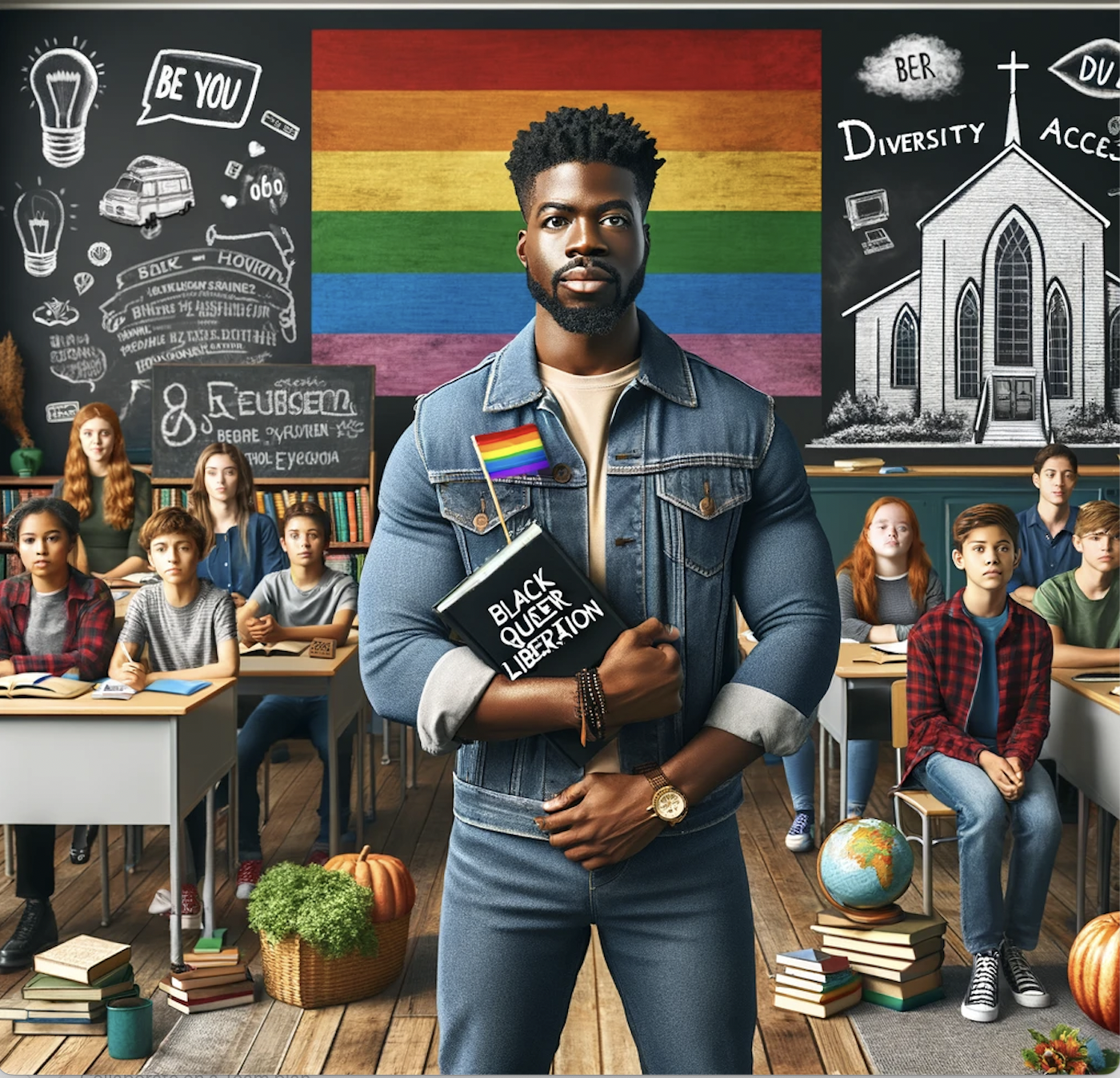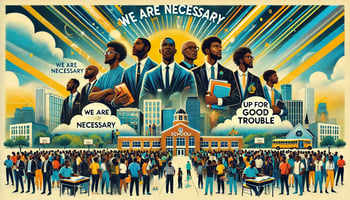This past weekend, I had the privilege of attending the Black Male Educator Convening (#BMEC2024)...
Navigating Identity and Liberation as a Black Queer Male Educator

As a Black, queer man, and an educator, my journey has been anything but straightforward. Reflecting on my experiences from my days as a 5th-grade teacher in Boston to my current role, I've faced the challenge of finding spaces that accept and nurture all aspects of my identity. My story is one of resilience, navigating intersections of race, sexuality, and profession, especially within the conservative bounds of a Pentecostal community in the South.
Struggling for Representation and Acceptance
Back in my late 20s, I taught Bible classes to young Black male teens. The challenge was not just in teaching but in finding stories that resonated with their lived experiences. Jesus as a Black teen navigating puberty, struggles with parenthood, and finding one's voice – these were narratives that were missing but desperately needed. In a church that did not provide a safe space for someone like me, I wrestled with my identity, teaching without being able to be fully myself.
In my Bible classes, I often had to draw parallels between biblical stories and the everyday lives of these young men. This required creativity and a deep understanding of their cultural and social contexts. According to research by Michael H. Cottman (2019), many Black youths struggle to see themselves in religious narratives that often exclude their lived realities. Additionally, scholars like E. Patrick Johnson emphasize the importance of “quare” studies, which focus on the intersection of race and queer identity, suggesting that traditional religious teachings often marginalize queer individuals of color. These insights underscore the critical need for representation and acceptance within religious communities.
In the school environment, being a Black male educator is rare. Being queer and out? Even rarer. I faced pressure from various sides – parents looking to me as a surrogate father, societal expectations of being a strong Black man, and navigating unwanted advances from colleagues. This environment policed not only my actions but also my very being. The dual pressure of performing heteronormative masculinity while hiding my true self created a constant internal conflict.
Research by Derrick P. Alridge (2008) highlights that Black male educators often face unique challenges, including heightened scrutiny and expectations. This scrutiny becomes even more intense for those who are queer, as noted by Kevin J. Mumford (2016), who discusses the compounded marginalization experienced by Black queer men in professional spaces. These insights reflect my personal struggles and the broader systemic issues at play.
The Journey Towards Self-Acceptance
Fast forward 20 years, and the struggle for acceptance continues. Today, the conversation around queer liberation and Black queer liberation remains limited. Despite societal progress, there are still very few spaces where I can nurture my spiritual self as a God-driven, God-affirmed human being. The intersection of my Blackness and queerness makes me susceptible to policing, not just by the law but by societal norms that dictate how a Black man should behave.
The quest for self-acceptance has been a long and winding road. In my current role, I still encounter resistance when trying to integrate my full identity into my professional and personal life. According to a study by Johnson and Henderson (2020), many Black queer individuals face isolation and lack of community support, which can hinder their journey toward self-acceptance. This resonates with my experience, as finding spaces that affirm both my Blackness and queerness remains a significant challenge.
Policing and Identity
Policing extends beyond the physical realm; it seeps into how we are expected to conform to gender norms. Growing up, I was often told how to walk, talk, and present myself as a man. In historically Black universities, this pressure was reinforced, dictating the prototype of manhood. Even today, as an educator and leader, I find myself excluded from certain spaces because I don't fit the alpha male persona expected in these environments.
Research by Richard Majors and Janet Mancini Billson (1992) on the concept of the "Cool Pose" highlights how Black men often adopt specific behaviors to cope with societal pressures. This concept extends to policing one's gender expression, where deviations from the norm are harshly judged. Furthermore, Roderick Ferguson (2004) discusses how queer Black men navigate these expectations, often facing exclusion from both Black and queer communities. These insights reflect the complexities of my own journey.
The Need for Inclusive Spaces
The need for inclusive spaces is critical. Spaces where vulnerability and authenticity are valued over conformity. Spaces where Black men can explore and embrace their femininity, nurturing aspects, and individuality without fear of judgment or exclusion. The liberation we seek must come from collaboration, where all voices and identities are valued.
Creating inclusive spaces requires intentionality and commitment. According to bell hooks (1994), the true community can only be built through radical openness and acceptance of diverse identities. This means not only acknowledging but celebrating the full spectrum of Black male identities, including those that challenge traditional norms. The work of scholars like Audre Lorde (1984) emphasizes the importance of embracing one's full self to achieve true liberation. These perspectives highlight the transformative potential of inclusive spaces.
Reflective Questions
- How do we create safe and inclusive spaces for Black queer men in education and religious communities?
- In what ways can we challenge and redefine traditional notions of Black masculinity?
- How can educators support and represent diverse identities in their teachings and interactions with students?
- What steps can religious institutions take to be more accepting and affirming of LGBTQ+ members?
- How do we address the internal and external policing of our identities in professional and personal spaces?
Recommended Podcasts
- Man Enough - Explores the concept of masculinity and challenges traditional gender roles.
- Express Yourself Black Man - Focuses on mental health and well-being for Black men.
- Men's Roundtable - Discussions on various aspects of Black male identity and experience.
- Boris Lawrence Henson Foundation - Addresses mental health issues within the Black community.
- Charlemagne the God - Offers perspectives on mental health, particularly for Black men.
Recommended TEDx Talks
- The Mask of Masculinity by Lewis Howes - Discusses how men can embrace vulnerability.
- A New Vision for Black Men by Cleo Wade - Addresses the redefinition of Black masculinity.
- The Power of Vulnerability by Brené Brown - Explores the importance of vulnerability.
Recommended Articles
- The Intersection of Race, Sexuality, and Gender in the Classroom - Discusses how educators can support diverse identities.
- Policing Black Queer Bodies: The Struggle for Acceptance - Explores the challenges faced by Black queer individuals in society.
- Creating Inclusive Spaces in Religious Institutions - Offers insights into how religious communities can be more affirming of LGBTQ+ members.
References
- Cottman, M. H. (2019). Segregated Faith: How Religion Divides and Unites Us. Beacon Press.
- Johnson, E. P. (2001). “Quare” Studies, or (Almost) Everything I Know About Queer Studies I Learned from My Grandmother. Black Queer Studies: A Critical Anthology.
- Alridge, D. P. (2008). The Educational Thought of W. E. B. Du Bois: An Intellectual History. Teachers College Press.
- Mumford, K. J. (2016). Not Straight, Not White: Black Gay Men from the March on Washington to the AIDS Crisis. The University of North Carolina Press.
- Johnson, E. P., & Henderson, M. G. (2020). Black Queer Studies: A Critical Anthology. Duke University Press.
- Majors, R., & Billson, J. M. (1992). Cool Pose: The Dilemmas of Black Manhood in America. Touchstone.
- Ferguson, R. (2004). Aberrations in Black: Toward a Queer of Color Critique. University of Minnesota Press.
- hooks, b. (1994). Teaching to Transgress: Education as the Practice of Freedom. Routledge.
- Lorde, A. (1984). Sister Outsider: Essays and Speeches. Crossing Press.




